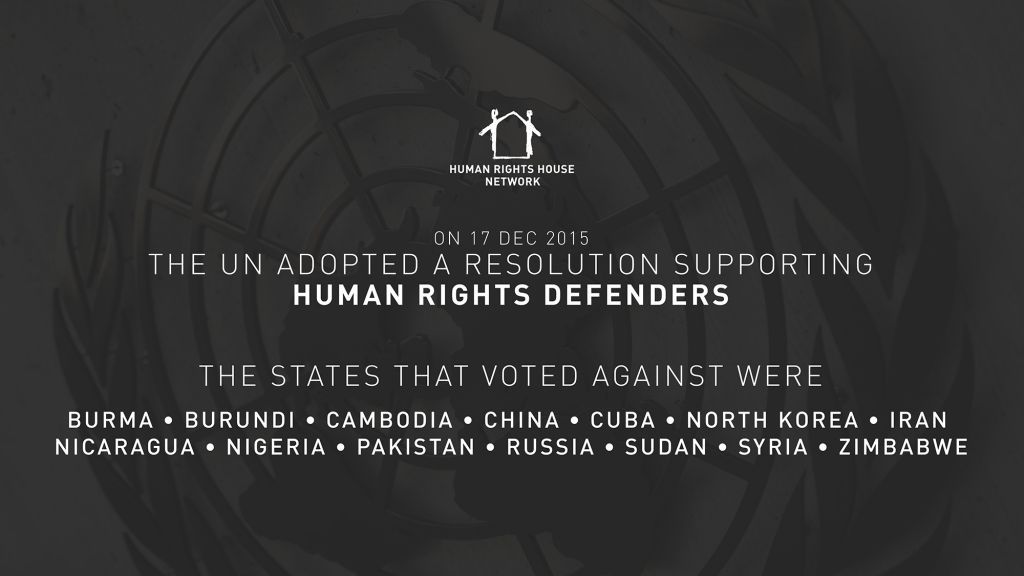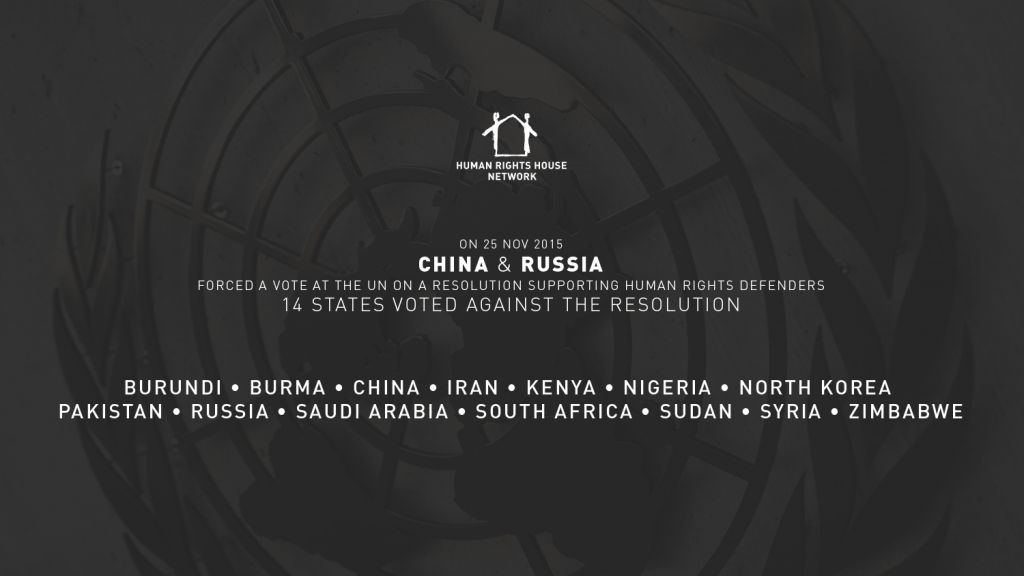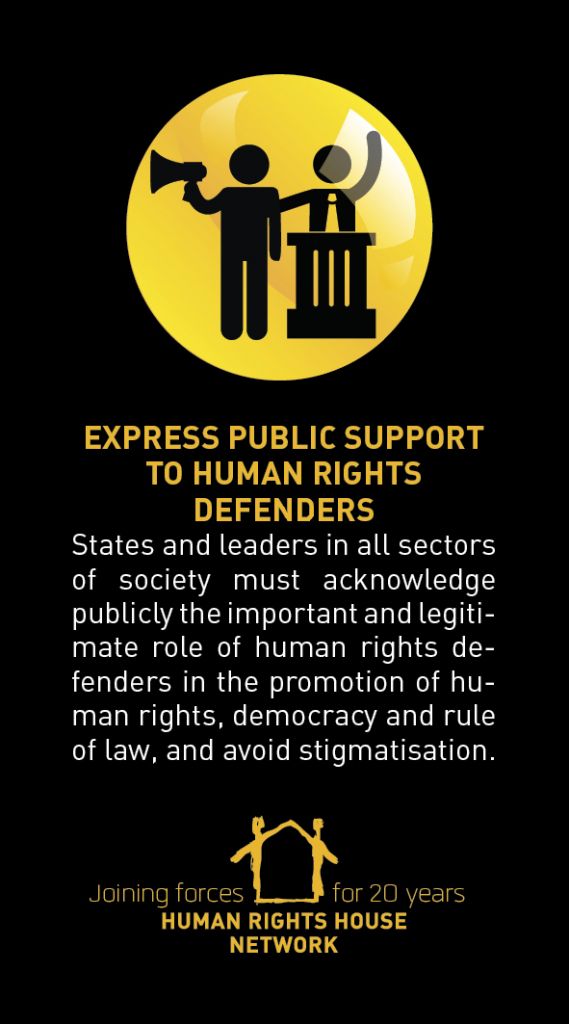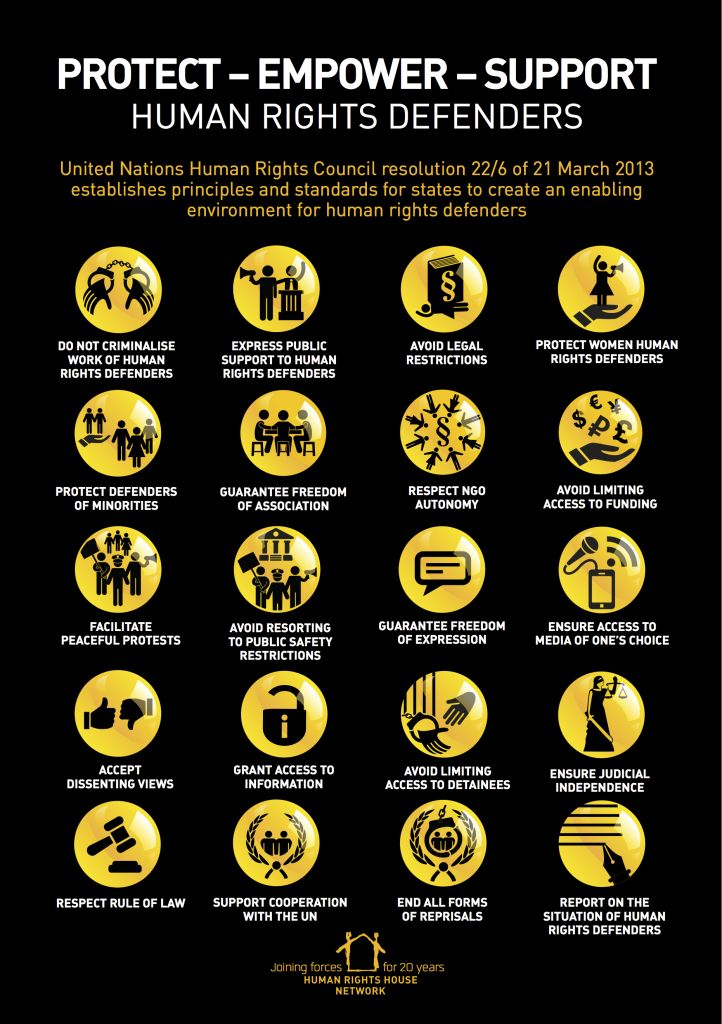Updated 18 December 2015
On 17 December, the UN General Assembly adopted the resolution on human rights defenders. This follows a vote to adopt the resolution at the Third Committee of the UN General Assembly back in November, and many months of hard work by civil society, state actors, and the international community.
Since the vote at the Third Committee, South Africa, Saudi Arabia, and Kenya have withdrawn their opposition, with South Africa voting in favour and Saudi Arabia and Kenya abstaining. The 14 states voting against the resolution at the General Assembly on 17 December are as follows.

Updated 26 November 2015
UN resolution expresses support for human rights defenders, against will of China and Russia
HRHN welcomes the extended and continued support for human rights defenders, but regrets that China and Russia took the unprecedented step of forcing a vote, breaking past unanimous support for human rights defenders at the UN.
“The resolution was adopted, recognising threats against human rights defenders on social media and the need to provide support for their families and legal representatives, and for the first time calling for the release of detained human rights defenders,” said Florian Irminger, Head of Advocacy at Human Rights House Network. “But we must also look at how the resolution was adopted. It is unprecedented in the UN system for States to force a vote on a resolution on human rights defenders.”
The resolution was adopted with 117 votes in favour, 14 against, and 40 abstaining. This reflects the increasingly repressive atmosphere for human rights defenders in the countries that voted against the resolution, as well as the international community’s opposition to these worrying conditions.

Before the adoption of the resolution, there was a clear sense that some States were tabling amendments to try to unpick or challenge existing norms, to reduce international scrutiny of their domestic policies and practices. These States have legislation restricting the right to freedom of association for human rights defenders, especially by restricting their access to foreign support, and it is these States that voted against the resolution.
“Russia and its supporters should not oppose resolutions on human rights defenders, but rather reflect on what is written in them and adapt their national legislation. Instead, they are trying to adapt international standards to their legislation, showing the insincerity of their engagement on this issue,” further commented Florian Irminger.
Following the adoption of the resolution, Luxembourg in the name of the European Union said: “Unfortunately, some national legislation [affecting human rights defenders] is in contradiction to international human rights law.” This statement was an answer to the arguments put forward by delegations opposing the resolution, especially by China and Russia, who contended that human rights defenders must work within the framework of national laws.
The adopted resolution makes clear that states cannot criminalise, stigmatise, impede, obstruct, or restrict the work of human rights defenders. It affirmed that States cannot adopt legislation discriminating human rights defenders in their right to associate and receive foreign support for their work.
The United States, in its comments after the vote, highlighted the importance of the resolution’s reference to protections for family members and legal representatives of human rights defenders, who are increasingly under pressure in repressive states, as documented in our report: Human Rights Lawyers at Risk.
 In its resolution, the General Assembly called again on all actors in society to express public support to human rights defenders and to publicly denounce acts of violence against them.
In its resolution, the General Assembly called again on all actors in society to express public support to human rights defenders and to publicly denounce acts of violence against them.
The imprisonment of human rights defenders is another worrying development witnessed in many countries, such as in Azerbaijan. For the first time, the General Assembly called for the release of all such detained human rights defenders.
In another unprecedented but very welcome move, the General Assembly denounced the intimidation of human rights defenders on social media.
“This vote has shown us which States are working against the right to be a human rights defender. They must be challenged by the international system and questioned by States believing in the right of anybody, individually or in association with others, to promote human rights. All States that have voted yes must now stand up and voice even stronger their support for human rights defenders in their national practices,” concluded Florian Irminger.
HRHN advocacy at UN General Assembly
Human Rights House Network is advocating for a new General Assembly resolution, as an answer to the increasingly worrying conditions under which human rights defenders work. HRHN sent a delegation to participate in the work of the General Assembly, including the negotiations on the resolution. The HRHN delegation includes Lara Aharonian, Director of the Armenian Women’s Resource Centre, and Florian Irminger, Head of Advocacy at the Human Rights House Foundation.
Ahead of the decision at the General Assembly, various Human Rights Houses also reached out to the governments of their countries, to ensure sponsorship of the resolution and ensure that the State representatives at the General Assembly would support Norway’s draft resolution.
States must not turn their backs on human rights defenders
Ahead of the vote today, 150 human rights defenders and civil society organisations from around the world, including many of the 100 member NGOs of HRHN, in a joint letter called on States to live up to their human rights commitments by supporting the resolution.





